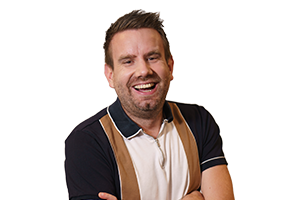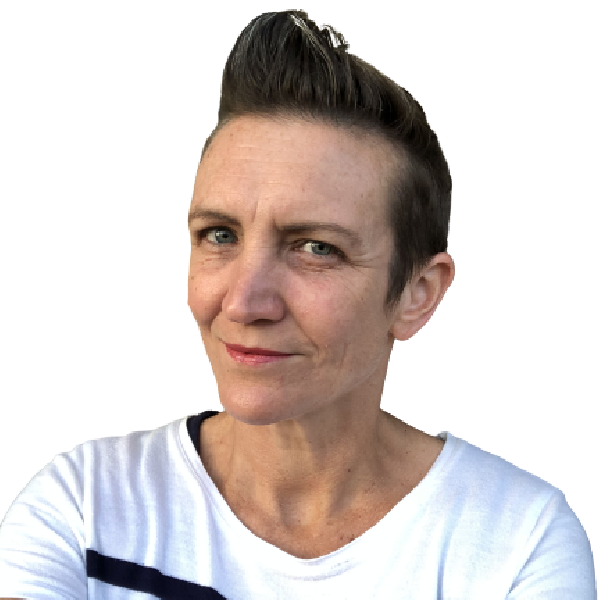Getting Into Radio + Media: Tips
Looking for your first job in the media or in content creation?
We've gathered a handful of people who work in the radio, media or content creation worlds and asked them for some tips to help people looking to take their first steps in the insutry. They've told us what they'd tell their younger selves if they could turn back time, too.
Tips and advice from radio pro's
Paul Swaine
Brand Partnership Director
Voiceworks.ai

I've been in the radio biz for 20 years now.
Starting way back in 2003 at Galaxy Fm as a commercial traffic manager. It wasn't all glitz and glam; I was scheduling ads, on basic pay, and pulling tons of unpaid overtime. But you know what? I fell in love with radio, found my tribe, 'cause radio brings the best folks together. There's something magical about how audio connects with different audiences at different stages of life, entertaining, educating, and even being a friend when needed.
Fast forward to today, I'm the Brand Partnerships Director at Voiceworks.ai - a cool voice technology and podcast consultancy, and we're also the home of Europe's largest 'The Sport Podcast Network'.
My gig involves helping clients and brands understand digital audio and the perks of advertising within that realm. Whether it's creating their podcast series, placing ads in other shows with sizable audiences, or giving advice on audio strategy - from building Smart Speaker skills to chat bots and snackable audio for social and websites, and even bespoke radio stations.
My tips...
Well, first of all, I'd say, "Don't do it..." Nah, just kidding!
-
Stay open-minded, eager to learn, and don't hesitate to ask questions - no one knows everything.
-
Network like crazy - hit up events and LinkedIn. Consider work experience to get your foot in the door.
-
Make yourself an invaluable asset and don't shy away from hard work.
-
Jump into as many projects as you can and embrace stepping out of your comfort zone.
-
Seek out training courses to grow and benefit the business, and always be a TEAM PLAYER - that's essential!
-
Respect and listen to each other's ideas, and remember, we're not working on the frontline, so have some fun along the way.
If I could turn back time...
I'd say 'trust me, it'll all pay off'.
The extra hours, late nights, and deadlines. Keep pushing forward, stay true to yourself, and banish self-doubt. There'll be days when you feel like you're not at your best or made mistakes, but you'll learn from them. Always keep listening and asking questions - learn from your peers and grow into the best version of yourself.
Be a strong team player, approachable and inclusive. Help others just like you'd like to be helped.
Kriss Herbert
Presenter and Content Director at Gaydio

When I first started, I got told a demo had ten seconds to impress...
Bosses were like, "make it the absolute best!" They said they'd take forever to listen, if they even got round to it, as they were really busy, too.
I used to dismiss that as rubbish - just something people said to pacify us. Turns out, it's true! I receive heaps of demos, and honestly, I don't get around to listening until I have a spare five minutes, which could be weeks away. Right now, I've got ten sitting in my inbox, untouched. And yep, I admit, I also judge them within the first 10 seconds, and if it doesn't hook me, I'm on to the next one!
My Tips
-
First off, don't send it via some link that's going to expire. It's happened way too many times that I click on the link and bam, "Item not available anymore." So annoying!
-
The golden nuggets need to be right up front, but honestly, make the entire demo amazing! Show off all your skills in those 3 minutes - the presentation, the personal touch, some serious stuff, a read, weather, anything that showcases your talent.
-
Speaking of time, keep it within 3 minutes. I won't bother with 10-minute demos, and even 3 minutes is pushing it. If yours is longer and has some fantastic audio 5 minutes in, trust me, no one's going to hear it. Keep it snappy!
-
Tailor your demo to the station you're sending it to. If it's an LGBTQ+ station, make sure the content is relevant. Likewise, if it's a local station focusing on issues in Bognor, they probably don't care about stuff happening miles away.
-
Remember, this is about YOU! It's your demo, not the station's sounds or music. I'm not expecting some award-winning production; I just want to know what you can bring to the table.
-
It doesn't matter much to me whether you send me real 'air check' audio taken from a broadcast recording or if you mock something up. Some folks want "real" clips, while others want station-specific demos. Just make sure whatever you include is top-notch!
-
Skills! Radio isn't just about radio anymore. If you have more talents, show them off! Can you edit videos? Are you a whiz at creating content? Do you code websites in your spare time? Let it all out! Even if you make a mean cup of tea, let us know!
Getting noticed...
Networking, my friend!
Back in the day, I sucked at it, but now it's so easy.
Follow the decision-makers on social media and engage with them. Don't slide into their DMs like a stalker, but a quick reply or comment can start a convo. Trust me, every programmer out there wants to find the next big thing, so show 'em what you've got!
Brett Harris
Presenter
Gaydio

I’m Brett and I present the weekday drivetime show on Gaydio.
When I'm not on air, I head up the Content Solutions team – the creative hub responsible for delivering commercial activity across our output.
I’ve always loved ‘the biz’ – growing up I knew I wanted to work in radio as it connects to an audience unlike any other medium. Everyone in radio works as part of a wider ecosystem and more often than not, the ‘off air’ roles play the biggest part in bringing concepts to life.
My tips...
-
Be curious, be inquisitive… I want everything I work on to be next level, every time and the only way I can do that is by being on top of my game – I make creativity my passion, which sometimes means I have to upskill in my own time, but I reap the rewards professionally.
-
Understanding the trends… Radio is an evolving beast and commercial spenders are always looking to find unique ways to tell their story and increase brand conversion. Be multi-platform! Gen Zs are changing the way the world works – this is the future, so it pays to look out for emerging media trends… embrace them and look forwards to exploit them for a client brief.
-
Don’t be afraid to say “no”… the commercial radio industry is fast-paced and demanding, and that's great, but learning when to push back is also important. Communicating realistic deadlines and setting expectations allows you and your colleagues to sing from the same hymn sheet and produce consistent, engaging and high-quality work.
-
Personal Brand… who do you want to be known as in the workplace? A great development coach from my time working at Global taught me the importance of a personal brand and although we all live our lives at such a fast pace now, it’s important to take time to look back and reflect – could I have communicated more efficiently, have I prioritised my team, do my team trust me?
If I can go back in time...
I'd tell myself radio is a really fun industry to work in.
There are so many roles out there it’s hard to pick the right one. Don’t be scared to look at some of the broader roles within the industry. I know I’ve created my best work by being part of a commercial team, and more often than not it's lead me to produce really engaging content that makes a difference.
Networking is key too, so if you have any questions or you feel intimidated by a role – don’t be! I once feared the word ‘commercial’ and now I thrive in it.
Vicky Hawksworth
Presenter
BBC Radio 1

First things first...
Getting into this industry isn’t a one-size-fits-all.
Everyone has a different story so don’t get caught up in comparing where your peers are or thinking you need to be in a certain place at a certain time.
My tips...
-
Find your own voice, draw inspiration from other presenters, but ultimately be yourself and develop who you are on air because this will be your selling point. The industry already has a Greg James and Chris Moyles, those spots are taken!
-
Tailor a demo to the station you’re applying for so they can hear how you would sound on their station. Be prepared to make a 1000 or 10,000 demos and send them out. Most will be ignored but don’t let that get you down because in the words of Lady Gaga ‘There can be 100 people in a room and 99 of them don’t believe in you but all it takes is one and it just changes your whole life…”
-
Get as much experience as you can, practice as much as you can and learn from the people around you. Ask them how they work, ask them to listen to your demos and ask for feedback and advice.
-
If you’re a student get to an SRA event - I was told in my third year that was ‘the way into radio’ - I went to one event that lead to an internship and then my first job in radio. It’s important to get into the same room as people in the industry.
-
Once you’re in - work hard because radio is a small industry full of brilliant people who will support and help you. If you show them how great and willing you are, then you’ll have made great connections.
-
Finally apply for things even if you think you won’t get it - I did and it got me to Radio 1.
If I can go back in time...
I would tell myself to listen differently.
I focused on what was being said which is important, but I gave less time to think about the audio elements, the bed changes, the clips, imaging within a feature and these are all really important things to note when you are then on air. I wish in my years of shows in community and local stations I had challenged myself more to come up with features and games that required a lot of different clips and elements because juggling all of that on the desk while presenting and presenting well is a craft and the more you can practice the better!
Secondly, I would say don’t be afraid to not only get a foot in the door but kick the door down. Send a second email to that radio station. I always worried I was mithering but the truth is people have very full inboxes and very busy schedules and it can’t hurt to remind them you exist.
Paris Munro
Presenter, Gaydio Breakfast

Got it? Flaunt it...
Radio isn't just radio anymore
It's a whole playground of possibilities. So, if you've got more to offer, flaunt it! Can you rock at video editing? Are you a master content creator? Maybe you dabble in website coding during your downtime? Whatever hidden talents you've got, let 'em shine! Even if you make a mean brew, don't hold back - let the world know what you're capable of!
Get noticed...
Back in the day, I kinda sucked at this, I'll admit.
Now, networking is the name of the game, and it's easier than ever. Get social-savvy! Follow the decision-makers on their platforms and engage with them. But, hold on, I'm not saying you should slide into their DMs and bug 'em all the time. A quick and genuine reply can spark a conversation. And guess what? We'll be peeking at your profile because every programmer out there is on the lookout for the next big thing! So, strut your stuff and let your talent do the talking!
Emma Goswell
Presenter, Producer and Podcast Creator
BBC

I've had the most amazing career and my only regret is not getting into radio sooner.
I started my career as a broadcast journalist reading news bulletins on commercial stations before I moved to the BBC.
I co presented Gaydio breakfast not once but twice and Gaydio drive.
I now present shows for Virgin Radio Pride, BBC radio Manchester and Radio Wales, while also producing podcasts for BBC sounds. My own podcasts include Coming Out Stories, Effin Hormones and 2 birds and a baby.
My tips...
-
If you do want to work in journalism you can’t blag it – you will need a post-grad in broadcast journalism or equivalent course. Fully understanding contempt of court, libel law, and election reporting restrictions is vital. I was once told unless I could prove a good knowledge of media law, editors wouldn’t touch me with a barge pole!
-
Understand that broadcasting is not only a huge privilege, it’s a huge responsibility. Get facts wrong, break guidelines and regulations and you won’t just ruin someone’s day and your reputation, you could potentially risk a huge fine for the station or even criminal charges.
-
Be inquisitive. I’m naturally nosey and fascinated by people, so journalism was a natural fit. As well as that you’ll need the confidence to ask questions that might be uncomfortable to ask. Get used to doing vox pops as you’ll be asked to do them a lot. If you can’t go up to complete strangers and ask them about the news of the day you might want to consider a different career!
-
Get the on air miles in. Real experience in live radio is worth way more than anything you learn in the classroom. Even getting work experience is tricky these days so be prepared to approach dozens of stations and don’t give up!
-
Keep listening. To other stations, other presenters, other news readers, and reporters – but most of all to yourself. It‘s painful to start with, but your bulletins, your reports, or your links will only improve with a lot of listening back, some self-reflection and honest feedback from those in the industry.
-
Work hard and don’t expect it to be easy. If you want to work 9 to 5 and have your weekends off, a good starting salary and a pension – perhaps work in comms or PR! My first job involved getting up at 3am on a Saturday and Sunday for very little money but I wouldn’t have it any other way. Radio has given me opportunities I could never have dreamt of. It may have been hard work but it’s been incredibly rewarding and there’s been a LOT of fun along the way!
If I could go back in time...
Stop feeling like you’re not good enough! I never had the confidence to work in radio in my 20’s so went back to college at 31 and felt like I was the oldest work experience person in Manchester! Like a lot of women I suffered massively from imposter syndrome – so even when I started working in the industry I felt like I shouldn’t be there!
I’d tell myself – you ARE good enough and don’t you dare give up because you will get there in the end!
